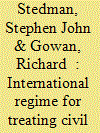|
|
|
Sort Order |
|
|
|
Items / Page
|
|
|
|
|
|
|
| Srl | Item |
| 1 |
ID:
155229


|
|
|
|
|
| Summary/Abstract |
By the standards of prosperity and peace, the post–Cold War international order has been an unparalleled success. Over the last thirty years, there has been more creation of wealth and a greater reduction of poverty, disease, and food insecurity than in all of previous history. During the same period, the numbers and lethality of wars have decreased. These facts have not deterred an alternative assessment that civil violence, terrorism, failed states, and numbers of refugees are at unprecedentedly high levels. But there is no global crisis of failed states and endemic civil war, no global crisis of refugees and migration, and no global crisis of disorder. Instead, what we have seen is a particular historical crisis unfold in the greater Middle East, which has collapsed order within that region and has fed the biggest threat to international order: populism in the United States and Europe.
|
|
|
|
|
|
|
|
|
|
|
|
|
|
|
|
| 2 |
ID:
073475


|
|
|
|
|
| Publication |
Boulder, Lynne Reinner, 2002.
|
| Description |
xiii, 728p.
|
| Standard Number |
1588260585
|
|
|
|
|
|
|
|
|
|
|
|
Copies: C:1/I:0,R:0,Q:0
Circulation
| Accession# | Call# | Current Location | Status | Policy | Location |
| 051591 | 303.64/STE 051591 | Main | On Shelf | General | |
|
|
|
|
| 3 |
ID:
158460


|
|
|
|
|
| Summary/Abstract |
The post–Cold War international order has promoted a “standard treatment” for civil wars involving the use of mediation to end conflicts and the deployment of peacekeeping forces to implement the resulting settlements. The United Nations has played a leading role in applying this standard treatment, which enjoys broad international support. By contrast, Western efforts to promote more robust humanitarian intervention as a standard response to civil wars remains controversial. While effective in relatively permissive postconflict environments, international mediation and peacekeeping efforts have proved insufficient to resolve harder cases of civil war, such as those in South Sudan and Syria. The UN has struggled to make the standard treatment work where governments refuse to cooperate or low-level violence is endemic. Growing major-power tensions could now undermine the post–Cold War regime for the treatment of civil wars, which, for all its faults, has made a significant contribution to international order.
|
|
|
|
|
|
|
|
|
|
|
|
|
|
|
|
| 4 |
ID:
048824


|
|
|
|
|
| Publication |
Washington, Brookings Institution, 1994.
|
| Description |
xiv, 322p.
|
| Standard Number |
0815764510
|
|
|
|
|
|
|
|
|
|
|
|
Copies: C:1/I:0,R:0,Q:0
Circulation
| Accession# | Call# | Current Location | Status | Policy | Location |
| 039677 | 303.69/OHL 039677 | Main | On Shelf | General | |
|
|
|
|
| 5 |
ID:
002348


|
|
|
|
|
| Publication |
Boulder, Lynne Rienner, 1991.
|
| Description |
xi, 254p.
|
| Standard Number |
155587200X
|
|
|
|
|
|
|
|
|
|
|
|
Copies: C:1/I:0,R:0,Q:0
Circulation
| Accession# | Call# | Current Location | Status | Policy | Location |
| 033573 | 341.52/STE 033573 | Main | On Shelf | General | |
|
|
|
|
| 6 |
ID:
079089


|
|
|
|
|
| Publication |
2007.
|
| Summary/Abstract |
Between 2003 and 2006 UN Secretary General Kofi Annan pursued the most ambitious overhaul of the United Nations since its inception. This transformation effort aimed to make the UN more effective in addressing non-traditional threats and to persuade the United States to re-engage with the world body. Launched during a time that was unpropitious for achieving far-reaching change, the effort nonetheless produced some surprising agreements. Several factors prevented greater achievement: the episodic attention of the Bush administration and the personal agenda of John Bolton, the US permanent representative to the UN; the failure of the UN Secretariat to pursue a capital based strategy that engaged heads of state and foreign ministers; and the decision by many member states that they would rather have an ineffective United Nations than an effective one that furthered the interests of the Bush administration. Whether future efforts to transform collective security will fall victim to the same fate depends in part on the actions and words of a new American president in 2009
|
|
|
|
|
|
|
|
|
|
|
|
|
|
|
|
|
|
|
|
|